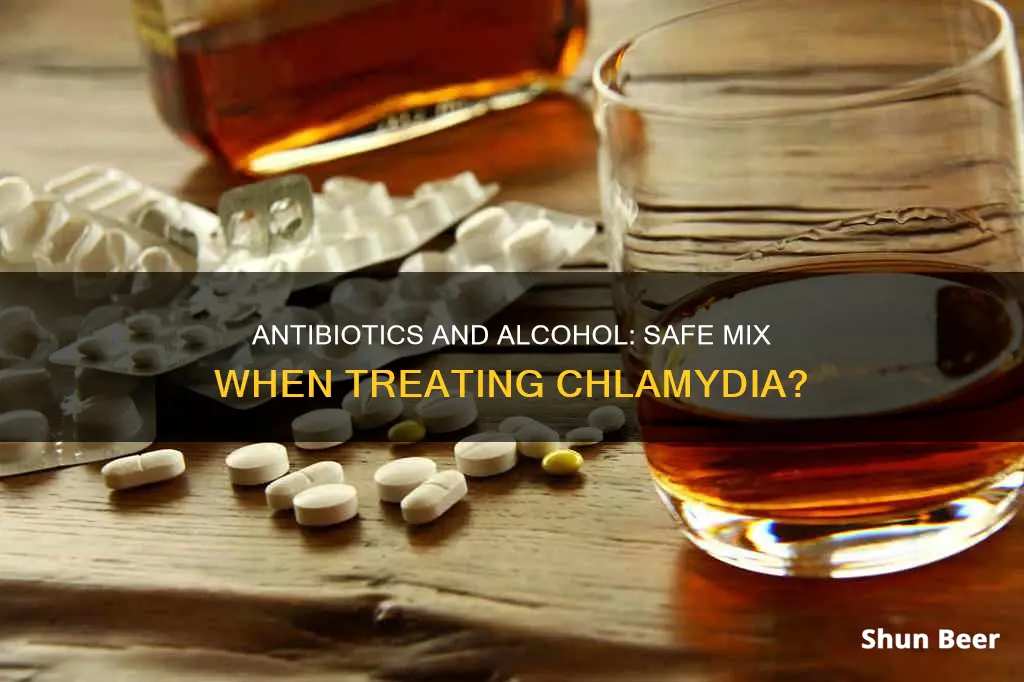
Chlamydia is a common sexually transmitted infection (STI) that is often treated with a course of antibiotics. The two most common antibiotics used to treat chlamydia are doxycycline and azithromycin. While the occasional drink or two while taking these antibiotics is usually considered safe, heavy drinking is not advised as it can reduce their effectiveness. Mixing alcohol and antibiotics can also lead to unpleasant side effects, such as nausea, vomiting, stomach pain, hot flushes, heart palpitations, headaches, dizziness, and drowsiness. Therefore, it is generally recommended to avoid alcohol while taking antibiotics to ensure the best possible outcome for treatment and to avoid any potential health risks.
| Characteristics | Values |
|---|---|
| Should you drink beer on chlamydia antibiotics? | It is generally advised to stop drinking when on a course of antibiotics. |
| Reasoning | Alcohol can interfere with the effectiveness of antibiotics and hinder recovery from the infection. |
| Exceptions | Occasional light drinking is usually fine, but heavy drinking can reduce the effectiveness of certain antibiotics. |
| Antibiotics for chlamydia | Doxycycline and azithromycin are the first-line treatments for chlamydia. |
| Doxycycline and alcohol | Doxycycline's effectiveness can be reduced when drinking alcohol, particularly in people who drink excessively or have a history of chronic drinking. |
| Azithromycin and alcohol | Azithromycin still works if you drink alcohol, but it can make you feel dizzy. |
What You'll Learn
- Doxycycline, the first-line treatment for chlamydia, is less effective when combined with alcohol
- Azithromycin, another treatment for chlamydia, can cause dizziness, which may be exacerbated by drinking alcohol
- Alcohol may increase the severity of common antibiotic side effects, such as drowsiness, dizziness, and digestive issues
- Drinking alcohol while taking antibiotics can hinder recovery by causing dehydration and weakening the immune system
- It is recommended to consult a doctor about drinking alcohol while taking antibiotics, as different antibiotics have varying interactions with alcohol

Doxycycline, the first-line treatment for chlamydia, is less effective when combined with alcohol
Doxycycline is an antibiotic medication used to treat various bacterial infections, as well as skin conditions like acne or rosacea. It is also used to treat respiratory tract infections, urinary tract infections, and some sexually transmitted infections (STIs) such as chlamydia. As a broad-spectrum tetracycline antibiotic, it can be taken within 72 hours of unprotected sex to help prevent common STDs.
Doxycycline is the first-line treatment for chlamydia. However, it is important to note that alcohol can interact with several antibiotics, including doxycycline, and may reduce its effectiveness. Research has shown that the use of doxycycline with alcohol results in reduced blood levels of doxycycline, which may affect its efficacy. This effect can last for days after discontinuing alcohol consumption. Therefore, it is generally recommended to avoid alcohol consumption while taking doxycycline to ensure optimal effectiveness of the medication.
The National Institute on Alcohol Abuse and Alcoholism defines heavy drinking as more than four drinks per day for men and more than three drinks per day for women. For individuals with a history of chronic drinking, heavy alcohol use, or liver problems, drinking alcohol while taking doxycycline can further reduce the antibiotic's effectiveness. In these cases, it is advisable to choose a different antibiotic or refrain from alcohol during the treatment course.
While occasional drinking (one or two drinks) while on doxycycline is usually considered acceptable, heavy drinking can hinder the body's ability to absorb the antibiotic effectively. This can lead to decreased potency and functionality in treating the underlying infection, potentially causing the infection to worsen or recur. Additionally, alcohol and doxycycline are both metabolized by the liver, and combining the two can increase the risk of liver toxicity and damage.
Furthermore, drinking alcohol while taking antibiotics like doxycycline can increase the likelihood of adverse side effects, including gastrointestinal issues (diarrhea, nausea, vomiting, stomach pain), central nervous system damage (dizziness, lightheadedness, impaired coordination), and dehydration, which may lead to kidney damage.
In summary, while occasional light drinking may be acceptable, heavy alcohol consumption can negatively impact the effectiveness of doxycycline, the first-line treatment for chlamydia. It is essential to follow the instructions and recommendations provided by your doctor or pharmacist regarding alcohol consumption while taking prescription medications.
Enjoying Beer and Zoo Lights: What You Need to Know
You may want to see also

Azithromycin, another treatment for chlamydia, can cause dizziness, which may be exacerbated by drinking alcohol
Antibiotics are often used to treat chlamydia and other STIs. While it is generally advised to refrain from drinking alcohol during a course of antibiotics, some antibiotics are more problematic than others when mixed with alcohol.
Azithromycin is an antibiotic used to treat many different types of bacterial infections, including respiratory infections, skin infections, ear infections, eye infections, and sexually transmitted diseases. It is also used to treat chlamydia.
Azithromycin is one of the antibiotics that can be taken with alcohol without reducing its effectiveness. However, it is important to note that azithromycin can cause side effects such as dizziness, which may be exacerbated by drinking alcohol. Therefore, if you experience dizziness as a side effect of taking azithromycin, it is best to avoid drinking alcohol.
Other common side effects of azithromycin include nausea, vomiting, and stomach pain. These side effects may be worsened by drinking alcohol, as alcohol can cause similar symptoms such as an upset stomach and dizziness. Therefore, even if you do not experience dizziness, it may still be best to limit your alcohol consumption while taking azithromycin to avoid potential adverse effects.
It is always a good idea to consult with your doctor or pharmacist if you have any questions or concerns about taking medication, including whether it is safe to drink alcohol while on a particular medication. They can provide personalized advice and recommendations based on your individual health and the specific medication you are taking.
Beer and Azithromycin: A Safe Mix?
You may want to see also

Alcohol may increase the severity of common antibiotic side effects, such as drowsiness, dizziness, and digestive issues
Antibiotics are powerful medications used to treat bacterial infections, such as respiratory illnesses and urinary tract infections. While it is generally advised to refrain from drinking alcohol when on a course of antibiotics, some people may still choose to consume alcohol in moderation. However, it is important to note that alcohol may increase the severity of common antibiotic side effects, including drowsiness, dizziness, and digestive issues.
Doxycycline, the first-line treatment for chlamydia, is one such antibiotic where alcohol can amplify these side effects. Research suggests that drinking alcohol while taking doxycycline can lead to reduced blood levels of the antibiotic, potentially affecting its efficacy. This effect can last for several days after discontinuing alcohol consumption. Additionally, heavy drinking can further decrease the effectiveness of doxycycline. For individuals with a history of chronic drinking, liver problems, or those taking multiple medications, it is recommended to avoid alcohol while taking this antibiotic.
Azithromycin, another treatment for chlamydia, does not have its effectiveness diminished by alcohol consumption. Nonetheless, as it can cause dizziness as a side effect, drinking alcohol in conjunction with this medication may exacerbate this feeling. Both doxycycline and azithromycin can cause an upset stomach and feelings of nausea, which could be worsened by drinking alcohol.
Metronidazole, an antibiotic used to treat other genital health issues such as trichomoniasis and bacterial vaginosis, is another antibiotic that does not mix well with alcohol. Consuming alcohol while taking metronidazole can lead to very unpleasant side effects, including nausea, vomiting, stomach pain, hot flushes, heart palpitations, headaches, dizziness, and drowsiness. These side effects are not exclusive to metronidazole and can occur with other antibiotics as well. Therefore, it is always advisable to follow the instructions provided with your medication and consult your clinician if you have any doubts or concerns.
The Magic of Beer Fob: How It Works
You may want to see also

Drinking alcohol while taking antibiotics can hinder recovery by causing dehydration and weakening the immune system
Drinking alcohol while taking antibiotics is not recommended, as it can hinder recovery and cause various side effects. Firstly, alcohol can dehydrate the body, which is already working hard to fight off infection. Dehydration can slow down the recovery process and make it more challenging for the body to heal. Additionally, alcohol consumption can weaken the immune system, making it harder for the body to fight off the infection and recover. This is especially important when taking antibiotics for an infection, as the body needs a strong immune response to effectively eliminate the pathogen.
Moreover, alcohol can interfere with the absorption and effectiveness of certain antibiotics. For example, doxycycline, a common antibiotic used to treat chlamydia, becomes less effective when combined with alcohol, especially in individuals with a history of chronic drinking or liver problems. Azithromycin, another treatment for chlamydia, can cause dizziness, which may be exacerbated by alcohol consumption. It is important to note that the side effects of antibiotics, such as drowsiness, dizziness, and digestive issues, can be amplified by drinking alcohol, leading to an unpleasant experience.
While some sources suggest that an occasional drink or two while taking antibiotics is unlikely to cause harm, it is always best to exercise caution. The specific antibiotic prescribed, the amount of alcohol consumed, and individual health factors can all influence the potential side effects. Therefore, it is essential to discuss alcohol consumption with a prescribing physician to understand the potential interactions and risks fully.
In conclusion, drinking alcohol while taking antibiotics can hinder recovery by causing dehydration, weakening the immune system, interfering with antibiotic absorption, and amplifying side effects. To ensure optimal recovery and avoid potential health risks, it is generally recommended to refrain from alcohol consumption while taking antibiotics and to follow the advice of a healthcare professional.
Hospital Beer Drinking: Is it Allowed?
You may want to see also

It is recommended to consult a doctor about drinking alcohol while taking antibiotics, as different antibiotics have varying interactions with alcohol
It is important to consult a doctor about drinking alcohol while taking antibiotics, as different antibiotics have varying interactions with alcohol. While some sources state that an occasional drink or two is usually fine, others recommend abstaining from alcohol altogether while taking antibiotics. The specific type of antibiotic you are taking is a key factor in determining whether it is safe to consume alcohol.
Doxycycline, a common antibiotic used to treat chlamydia, can interact with alcohol in people with a history of chronic drinking or heavy alcohol use, as well as those with liver problems. In these cases, drinking alcohol while taking doxycycline can reduce the effectiveness of the antibiotic. However, if you do not fall into these categories, it is generally considered safe to occasionally consume alcohol while taking doxycycline without impacting its effectiveness.
Another antibiotic, Azithromycin, which is also used to treat chlamydia, does not lose its effectiveness when consumed with alcohol. However, as it can cause dizziness, it is recommended to refrain from drinking alcohol while taking this medication.
Metronidazole, an antibiotic used to treat trichomoniasis and bacterial vaginosis, is known to have a very unpleasant interaction with alcohol. Consuming alcohol while taking this antibiotic can cause nausea, vomiting, stomach pain, hot flushes, heart palpitations, headaches, dizziness, and drowsiness. It is recommended to avoid alcohol completely when taking Metronidazole and for at least 48 hours after finishing the course of medication.
While alcohol in moderation is generally considered safe when taking most antibiotics, it is important to note that alcohol can hinder your recovery by causing dehydration and weakening your immune system. Therefore, it is advisable to refrain from drinking alcohol until your infection has completely cleared up. Additionally, certain antibiotics may require you to refrain from drinking altogether, so it is always best to consult your doctor or pharmacist for specific advice regarding your medication.
Drinking Alcohol-Free Beer: Is It Safe to Drive in the UK?
You may want to see also
Frequently asked questions
It is not recommended to drink alcohol while on antibiotics. However, if you are taking doxycycline, an occasional drink or two is usually fine, but heavy drinking can make the antibiotic less effective. Azithromycin, another treatment for chlamydia, can be taken with alcohol but may cause dizziness.
Alcohol can reduce your energy and delay recovery from illness. It can also cause negative side effects, such as nausea and vomiting, especially when combined with certain antibiotics like metronidazole and tinidazole.
It is recommended to avoid alcohol and opt for non-alcoholic drinks or mocktails.







